- Home
- Jane Peart
A Tangled Web
A Tangled Web Read online
A Tangled Web
Jane Peart
Table of Contents
Cover Page
Title Page
PREFACE
PART ONE
ONE
TWO
THREE
FOUR
FIVE
PART TWO
SIX
SEVEN
EIGHT
NINE
TEN
PART THREE
ELEVEN
TWELVE
THIRTEEN
FOURTEEN
FIFTEEN
SIXTEEN
SEVENTEEN
EIGHTEEN
NINETEEN
TWENTY
TWENTY-ONE
TWENTY-TWO
TWENTY-THREE
ACKNOWLEDGMENTS
Books by Jane Peart
Copyright
About the Publisher
Share Your Thoughts
PREFACE
When the first transcontinental railroad was completed in 1869, it transformed life in the United States. We became a mobile society. Americans were able to travel from one coast to the other—however, not always with comfort and enjoyment.
By opening a chain of restaurants and hotels along the Santa Fe Railroad, Fred Harvey filled that need. He provided train passengers with first-class dining facilities and delicious food elegantly served by an elite class of waitresses called the Harvey Girls.
I have set my novel in the early part of the twentieth century, when the Harvey House chain was well established throughout the Southwest, and its staff of young women highly regarded. I have taken the liberty of using basic facts and fictionalizing them, moving locations and events to make an interesting story I hope you will enjoy.
PART ONE
ONE
SEPTEMBER 1903
The huge Chicago railroad station teemed with passengers hurrying to catch their trains. Darcy Welburne, a slim, pretty young woman, stood on the platform, anxiously studying the departure schedule. Clutched tightly in her hand was her ticket for the Santa Fe Railway line taking her to her destination: Juniper Junction, Kansas. Her heart was thundering. Just turned twenty, she had never before traveled alone nor more than thirty miles from her home in eastern Tennessee. Had she made a terrible mistake? Well, it was too late to wonder, too late to change her mind. She was on her way now. However, she had no idea that this journey would alter her life forever.
“Boarding now for Atchison, Topeka, Santa Fe, and all points between,” the conductor announced. As Darcy showed him her ticket, he commented, “Juniper Junction, eh? That’s just a ten-minute whistle-stop, little lady.” Somehow that didn’t make her feel any better.
She mounted the steps to her coach. Juggling her suitcase and valise, she made her way down the aisle, looking for a vacant seat.
At the end of the car she found an empty one. She set down her smaller bag, then lifted the larger one into the overhead rack. A little out of breath from the effort, she started to sit down, when she saw a tract lying on her seat.
Printed in large bold letters on the front were the words “You need Jesus.” Probably left there by some zealot, she thought. She picked it up and distractedly put it in her handbag with her ticket stub. Then she sat down and leaned her head back on the worn, green upholstered seat.
With a jolting lurch the train started forward, moving through the railroad yard. Outside the city it began to pick up speed, taking Darcy hundreds of miles from home and the man she loved. She fought the beginnings of homesickness. After all, this was her own decision. Nobody had forced her to go. In fact, most of the people she knew had practically begged her not to leave Willowdale.
Darcy stared out the sooty window. With the clickety-clack of the train’s wheels, she could hear her mother’s voice endlessly repeating, “Mark my words—you’ll regret it.”
It had been an impulsive decision to break her engagement to Grady Thomas, to apply for a teaching position in Kansas. But a promise was a promise, and Grady had broken his promise to her not to run for sheriff.
How could he have done this to her? He knew how she felt about politics after having lived with her uncle the judge, who had to run for reelection every four years.
Their terrible quarrel rushed back to her. She had never been so angry. Certainly it was a righteous anger.
“You gave me your word!” she accused.
“I know I did, but—”
“There are no buts to a promise.”
“Ah, Darcy, come on—a man’s got to think of his future, don’t he? Try to better himself? If I make sheriff, it will be for you too! Our future.”
“Being in politics is not my future! I had enough of it from the time I was a little girl and Mama and I moved in with Aunt Maude and Uncle Henry. I saw firsthand what kind of life politics is for the wife, and I knew I didn’t want what Aunt Maude put up with. Riffraff of all kinds parading in and out of the house any time of night or day. Fixing meals for ten or twenty or more at the drop of a hat. Having him gone to rallies, electioneering barbecues, and picnics all up and down the county six months out of every year. Having people banging on the front door at midnight, getting threatening letters besides. And being a sheriff’s wife would probably be even worse. No, thank you. I’m not marrying a politician. So you can forget marriage and forget engagement.” Out of breath, she had tugged off the garnet solitaire from the third finger of her left hand and held it out to Grady. “Here’s your ring back!”
“Ah, honey, you don’t mean that—”
“I never meant anything so much in my life!” she had flung back at him.
Grady should have known better. After all, they had known each other since childhood. He should have known Darcy wouldn’t take his broken promise lightly.
Everyone was stunned at what she did, and further shocked when she got the acceptance letter from the Juniper Junction school board.
Her mother was not the only person who had argued against the broken engagement, her decision to leave Willowdale. Her spinster aunt Sadie had confided sadly, “You’ll be sorry. I speak from my own experience. I did the same thing at eighteen and look at me now—a dried-up old maid living with relatives, with no home to call my own, no man to provide for me, no children to cuddle…”
Her Uncle Henry was outraged. “Don’t a man have the right to make his own choice of how he makes a living? It’s not a woman’s place to tell him. Besides, sheriffs get paid a good salary, have standing in the community—a young woman could do a lot worse. A whole lot worse.”
Even her best friend Carly Hampton, who had always admired Darcy’s gumption, was taken aback. “I can’t believe you’re letting go a man that almost every girl in town has set her cap for one time or another. Somebody else’s bound to snap him up quick as you can say fiddle!”
“Let them, then!” Darcy had retorted with a toss of her head. “Who’d want a man who can’t keep a promise?”
She’d been mighty sure of herself when she’d said those words, sure that Grady would withdraw from the sheriff’s race. But then, Grady could be stubborn too. He’d let her go, hadn’t he? Now she wondered if maybe she’d spoken too hastily, burned her bridges too recklessly.
A picture of her former fiancé flashed into her mind. At six foot two Grady carried his height with a lanky ease. He was handsome in a rugged, outdoorsy way. His features were regular and his blue eyes most always held merriment. He was capable of boyish pranks as well as a genuine sweetness. In spite of herself, Darcy’s heart softened a little as she remembered his bewildered expression at her ultimatum. But it was his own fault. Maybe this would teach him a lesson.
Deaf to entreaties from family and friends, she had packed, bought her ticket, and was on her w
ay. A long way from Willowdale, her hometown, where she had been born, grown up, gone to school, fallen in love.
As the train rattled through the unfamiliar countryside, Darcy’s troubled thoughts turned to the place that had been home to her since she was five years old.
The big, square, white frame house, built in 1850 by Joshia Baldwin, stood a block from Main Street. It was referred to by the townsfolk as the Beehive, not only because of the dome-shaped cupola on its roof but also because three generations of the Baldwins had occupied it. The matriarch Beatrice, a formidable old lady of seventy known as Grandma Bee, still lived there. Her three daughters made their home there, too: Maude, the oldest, married to Judge Henry Roscoe, who as a young lawyer and a new bridegroom had moved into his mother-in-law’s house; Sadie, who had never married; and Ellen, who when widowed had returned home with her little girl. The household at 220 Elm Street was a close-knit one. That is why Darcy’s decision had caused such an upset.
She had grown up surrounded by love and caring. Although she had sometimes found it cloying and almost smothering, still she knew she would miss it all. But there was no time for second thoughts now. As Grandma Bee was fond of saying, “No use crying over spilled milk.” She was on her way. She had to think it was the right choice, that she hadn’t made a dreadful mistake.
The hours on the train were tedious and long. Darcy found herself nodding off once or twice. Suddenly she was alerted by the conductor’s voice loudly calling out, “Juniper Junction!”The train was slowing to a stop. This was it. She had reached her destination.
TWO
Darcy quickly gathered her belongings and hurried to the coach door and stepped down from the train onto the platform. A violent gust of wind whipped her skirt and blew sand into her face. She dropped her valise to grab the brim of her small feathered hat to keep it from flying off her head.
Within minutes the train started up again and moved down the track, disappearing around the bend, leaving her standing forlornly on the deserted platform. Her trunk, evidently tossed off the baggage car, stood at the end of the platform. There were no porters, no other passengers. In fact, there was no one in sight. Was she the only person getting off here?
Propelled by the strong wind at her back and wobbling slightly in her high-heeled boots on the uneven boards, she teetered toward the yellow frame station house.
It took all her strength to wrest open the door, pushing against it with her shoulder. Inside it was empty except for the man behind the ticket window. She walked over to the counter and said politely, “Excuse me, sir. I’d like some information.”
At first there was no indication that he had heard her. Then slowly he shifted the green eyeshade he wore and looked up at her. “What’s that?”
“Is there somewhere I could get a room, freshen up?”
He frowned as if puzzled. “Freshen up, eh? You fixin’ on stayin’ long?”
“Well, that depends.”
“Depends?” He peered at her through wire-rimmed glasses.
“Actually, it depends on whether—” Darcy halted. Why go into all this with the railroad station clerk? “You see, I’ve been on the train a long time, and—” Again she stopped. Of course he knew that. “I’d just like a room to—the reason doesn’t matter. Could you simply tell me if there is a place nearby where I could rent a room?”
He squinted and gave her a calculating look.
Darcy felt as though he were making an inventory of her with her fashionable gray traveling suit and smart little hat. Not your everyday sight in a town like this, she supposed.
He jerked his thumb over his shoulder.
“The Grand’s the only hotel in town. Jest acrost the street. I guess that’ll do you.”
“Thank you,” she said coolly, wondering if all residents of this town were as unhelpful to strangers. However, she needed some more information, and he was the only one around at the moment.
“By the way, could you please tell me when the school board meets?”
“Humph, the school board?” He paused a second before answering. “Tonight at the town hall. Six-thirty sharp.” Curiosity glinted in his narrowed eyes. He seemed about to ask her why she wanted to know, but Darcy turned away to avoid answering. Why should she explain to this person who had treated her in such an unfriendly manner? Then, remembering one of Grandma Bee’s favorite sayings, “You can catch more flies with honey than with vinegar,” Darcy returned to the ticket counter. It was always important to make a good impression. Who knew but that this man might be a member of the school board? In small communities the most unlikely people sometimes held positions of influence. Smiling her sweetest, Darcy said, “I’m here to fill the position for the grammar school.”
The man’s eyebrows shot up. “Well now, is that a fact?”
“Yes, so you see, until things are settled—” She halted. “Would it be possible for me to leave my trunk here until I know where I’ll be living?”
“Yes, ma’am. I’ll see it’s safe until”—he smiled wryly—“you need it.”
“Thank you,” Darcy said again, a bit tentatively. Something in the man’s tone made her uneasy. Probably her imagination. Having come so far into this new environment, everything felt strange.
Braving the wind, carrying her suitcase and valise, she crossed the dusty street. Directly opposite the station house stood a weathered two-story with a wooden sign swinging over the entrance: “The Grand Hotel.”
Not very grand, Darcy thought as she entered. The floor was bare, stained from tobacco juice that had missed the battered brass spittoons placed near several dilapidated chairs set at irregular angles around the lobby.
At the other end, louvered swinging doors led into the saloon, from which were emerging clouds of smoke as well as the sound of male voices, the clink of glasses, loud laughter. Even though it wasn’t yet four o’clock, business seemed to be booming.
Looking straight ahead, she walked up to the registration desk. A bald-headed man in a boldly striped shirt, sleeves held back from his wrist with elastic bands, watched her approach speculatively. It occurred to her that perhaps this hotel didn’t have many women guests. Maybe that was why he was eyeing her so curiously. Come to think of it, she hadn’t seen any women since her arrival. Weren’t there any female residents in this town?
The man gave her a long appraising look. “Yes, ma’am?”
“I would like a room, please.” Darcy tried to sound assured, as if being alone in a strange town and acquiring a hotel room was not something unusual for her.
“For how long?”
“I’m not sure. For tonight at least.” She felt sure that when she introduced herself to the chairman of the school board, he would tell her what accommodations had been made for her. The employment advertisement she’d answered had stated that living quarters would be provided. Until then she would have to put up with whatever was available. At the moment this was it.
The clerk peered over the counter. “Is that all of your luggage?”
“I left my trunk at the train station. Perhaps you can send someone over for it later?” She felt uncomfortable having to explain her circumstances to everyone. She drew herself up to her full five foot four and asked, “How much?”
“One dollar for the night. In advance.”
Darcy drew a dollar out of her purse and handed it to him.
“Two if you want a bath. Fifty cents for extra hot water and towels,” the clerk rattled off as he turned to get a key off a hook on the board behind him. He laid the key on the counter. “Number six. Third door to your left at the top of the stairs.” He pointed a grubby index finger to a stairway.
Darcy went up the rickety steps and down a narrow, dark hall. At the door with the brass numeral six, she inserted the key in the lock and turned it, opened the door into a room about the size of their pantry at home. It contained a single iron posted bed, a straight chair, a washstand holding a chipped enamel pitcher and bowl. She walked across the creaky
bare floor—which tilted slightly, as if it had been laid by a tipsy carpenter—to the window. She pushed aside thin curtains stiff with ingrained dust and looked out. The street below was deserted. Nobody seemed to be going about the business of the town. She suppressed a little shudder. Was this one of those legendary ghost towns of the West? What on earth had she got herself into?
She sat down gingerly on the side of the bed and sighed deeply. Suddenly a wave of loneliness swept over her. Tears threatened. She refused to give way to them. She couldn’t appear at the meeting tonight red-nosed, swollen-eyed. This wouldn’t do. She emptied her handbag on the bed in search of a hankie. Among the contents was the employment ad, which she had impulsively cut out of the newspaper and answered the week after she’d ended her engagement to Grady. She reread it now.
Needed immediately. Full-time teacher for grades one through eight in Juniper Junction, Kansas. Desperate.
Desperate! Well, she was desperate, too.
With it another scrap of paper had fallen out. It was the crumpled tract she had absentmindedly tossed into her purse when she found it on her seat on the train. “You need Jesus,” it reminded her. She replaced it in her purse and continued to sift through the small pile on the bed.
She noticed a small brown-paper package she didn’t remember putting in her handbag. She unwrapped it and found a tiny ring box. She recognized it immediately. How had it got in here? Maybe softhearted Auntie Sadie, sympathetic to Grady, had placed it there. Folded around the little jewel box was a note written in a familiar boyish scrawl.
Dear Sweetheart,
I’m giving you back your ring. I don’t want to be unengaged. I meant it for keeps. I don’t care what you say. Your aunt told me you won’t see me or talk to me, so I asked her to see that you got this anyway. She says teachers’ contracts are usually just for a year. A lot can happen in a year. I could even lose the election. I’ve loved you for a long time and I can’t quit now.

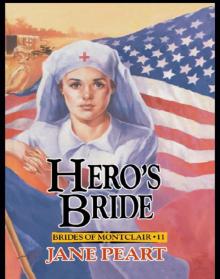 Hero's Bride
Hero's Bride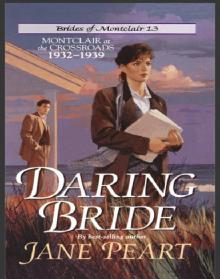 Daring Bride
Daring Bride Runaway Heart
Runaway Heart Promise of the Valley
Promise of the Valley Gallant Bride
Gallant Bride The Pledge, Value
The Pledge, Value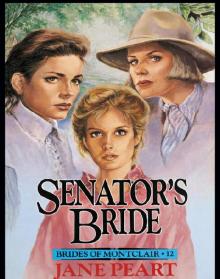 Senator's Bride
Senator's Bride Valiant Bride
Valiant Bride Shadow Bride
Shadow Bride Destiny's Bride
Destiny's Bride A Tangled Web
A Tangled Web Folly's Bride
Folly's Bride The Promise
The Promise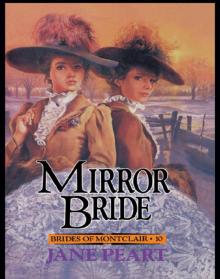 Mirror Bride
Mirror Bride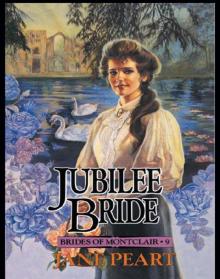 Jubilee Bride
Jubilee Bride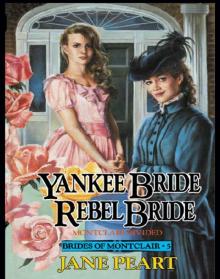 Yankee Bride / Rebel Bride
Yankee Bride / Rebel Bride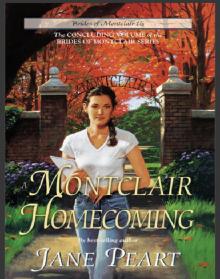 A Montclair Homecoming
A Montclair Homecoming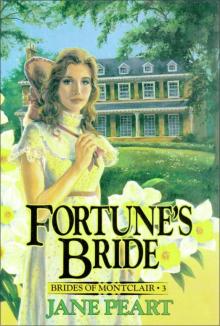 Fortune's Bride
Fortune's Bride Undaunted Spirit
Undaunted Spirit Love Takes Flight
Love Takes Flight The Risk of Loving
The Risk of Loving The Pattern
The Pattern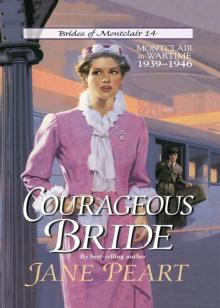 Courageous Bride
Courageous Bride